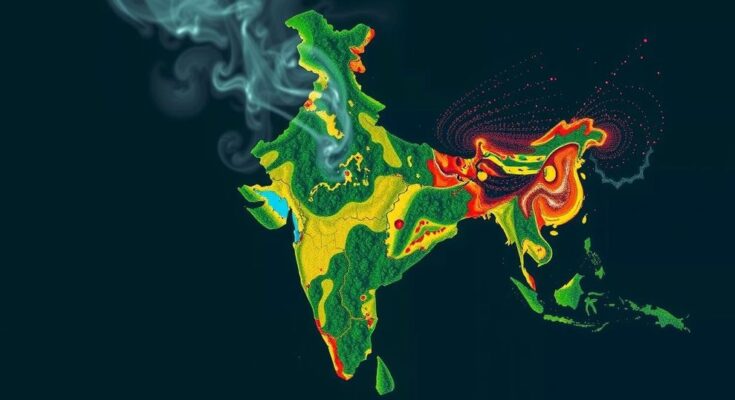The Lancet report reveals alarming health impacts of climate change in India, with record levels of heat exposure and economic losses. Significant populations are at risk from rising sea levels and increased disease transmission, underscoring the need for urgent climate action.
A new report from The Lancet has highlighted the significant health impacts of climate change in India, revealing that the country is among the most affected by this global crisis. Released on October 30, the report ‘Countdown on Health and Climate Change’ emphasizes that 10 of the 15 health indicators assessed have reached alarming record levels, indicating an urgent need for action. The report states that, in 2023, individuals faced an average of 50 more days of health-threatening temperatures than they would have without the influence of climate change. Moreover, last year’s extreme drought impacted nearly half of the world’s land area. In India, the situation is even more precarious; the report reveals that individuals experienced over 2,400 hours of hazardous heat exposure per year, leading to significant risks for vulnerable populations, especially infants and the elderly. Economic losses are substantial as well, with potential labour hour losses estimated at 181 billion hours due to heat-related exposure, translating into a potential income decline of USD 141 billion in 2023. Coastal areas in India are equally threatened by rising sea levels, affecting approximately 18.1 million residents living less than one metre above sea level. The Sundarbans, among other regions, serves as a poignant example of climate-related migration, with studies indicating that climate change efforts contribute significantly to family relocations. Furthermore, the report details a concerning shift in the transmission of infectious diseases, such as malaria and dengue, exacerbated by climatic changes. The comprehensive analysis calls for governments to reassess their priorities regarding fossil fuel investments, as these continue to divert essential resources from health and climate initiatives. The report concludes that if India aims for rapid development, it must urgently address these climate-related health impacts to ensure sustainable growth.
The Lancet’s ‘Countdown on Health and Climate Change’ report provides critical insights into the relationship between climate change and public health, identifying record-breaking health threats across the globe. The findings particularly spotlight India, drawing attention to the exceptional vulnerability of its population to heat-related stress and the economic repercussions of climate inaction. Given the increasing trend in climate-induced disasters and health complications, the urgency for effective climate policies and interventions has never been more critical.
In summary, the Lancet report underscores the dire health impacts of climate change in India, highlighting significant increases in heat exposure, economic losses, and shifts in disease transmission. With millions at risk from rising sea levels and extreme weather, the report advocates for immediate and comprehensive actions to mitigate climate impacts and allocate resources towards health protection. For India to thrive as a developed nation, investing in resilience against climate change is imperative.
Original Source: www.downtoearth.org.in




